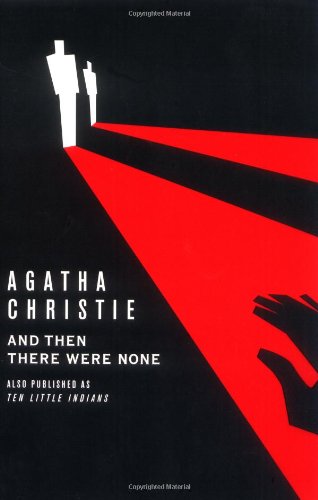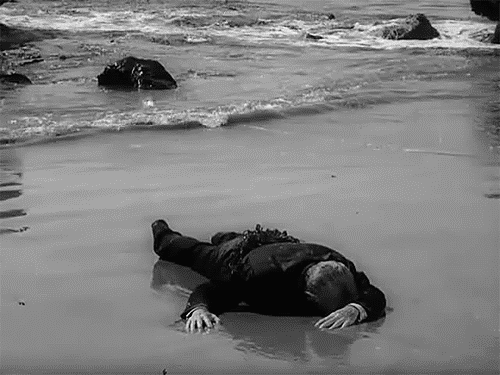October 17, 2022
This lovely mystery book is first and foremost about the administration of the long-overdue justice, right? At least that's what the mastermind behind it all believes.
But the question is - who has the right to decide what justice is? And who is to decide what punishment serves the crime? And is perceived justice at all costs the ultimate goal, or is it the frequently pointless work of a maniac? As a matter of fact, what is justice after all?
I think the story of this book () is familiar to most readers. It is a lovely and fascinating idea. Ten people are lured onto a remote island under false pretenses just to realize that they are all about to be punished by death for the 'crimes' that they have committed in the past and have gotten away with. Killed in a manner predicted by a silly yet ominous children's poem with the conclusion of "... and then there were none". What's more, they come to realize that the mastermind - or maniac? - has to be among them. And the (very polite, in the traditional British way) game of survival begins, complete with all the necessary societal rituals? and classism? that are not disposed of even under the threat of imminent demise.
And as, despite the precautions, the number of people trapped on the island continues to decline, the uneasy tension sets in, and the impeccable facades begin to crack.
The story is captivating and very smart, and the ending had me baffled for a bit the first time I read it. It has a neat resolution despite an obvious plot hole (but hey, it doesnˇŻt bother me that much). It's an enjoyable read to say the least.
But what made me unsettled both of the times I read it was the nagging question of justice, as I mentioned above. Yes, on one hand, it's almost poetic justice to punish the criminals who thought they got away with it. On the other hand, is eye-for-an-eye the best way to get even? And who's to judge, anyway? Who is either conceited enough or deranged enough to assume that he has the right and the moral authority to determine guilt and the extent of punishment just like that?
Don't get me wrong - the people accused on the island are undeniably guilty (even though it's not necessarily murder as we think of for some of them - Vera Claythorne is really guilty of neglect, albeit with a desire to kill, and Emily Brent is pretty much guilty of being a judgmental ¨ąber-righteous heartless prude). But the degree of their guilt varies quite significantly in my perception, and it does not always coincide with what their 'unknown' judge/executioner thinks (running two children over with a car and feeling no remorse is to me worse than firing a pregnant servant who then goes on to kill herself, for instance). And is arbitrarily and single-handedly determining their guilt and doling out punishments not just as much (or even much worse) or a crime than they have committed? Conceited, self-righteous crime? Decide for yourself.
Speaking of guilt - this novel has quite a bit to say on this subject. You see, many of the characters have already been judged and condemned by their own selves. Vera Claythorne and General Macarthur both are tormented by their guilt, and at least one of them become a direct victim of it. Interestingly, others, no less guilty, are not tormented by their conscience at all. But ultimately this does not matter at all for their survival; only the fact that they were deemed guilty. So should being tormented by guilt versus a cold-blooded killer factor at all in the administration of justice?
These are the thoughts that kept running through my head as I was reading this excellent non-traditional critically-acclaimed specimen of mystery literature. And therefore bravo to Miss Christie for making me think and care - and not just mindlessly flipping pages to get to the bottom of the whodunit. Because 'WHO' was much less important to me than 'HOW' and 'WHY' - especially 'WHY'.
For all of this, I give it the unflinching guilt-free 4 stars.
ˇŞˇŞˇŞˇŞˇŞˇŞ
Also posted on .
But the question is - who has the right to decide what justice is? And who is to decide what punishment serves the crime? And is perceived justice at all costs the ultimate goal, or is it the frequently pointless work of a maniac? As a matter of fact, what is justice after all?
I think the story of this book () is familiar to most readers. It is a lovely and fascinating idea. Ten people are lured onto a remote island under false pretenses just to realize that they are all about to be punished by death for the 'crimes' that they have committed in the past and have gotten away with. Killed in a manner predicted by a silly yet ominous children's poem with the conclusion of "... and then there were none". What's more, they come to realize that the mastermind - or maniac? - has to be among them. And the (very polite, in the traditional British way) game of survival begins, complete with all the necessary societal rituals? and classism? that are not disposed of even under the threat of imminent demise.
?The politeness and overt show of respect to one another even in the face of imminent murder by someone in their midst - because, of course, you would not want to offend anyone. Continuing to socialize and take meals together. Insisting on chivalry when a woman could be the murderer just as well as a man - these are just some of the examples.
? Just think of everyone expecting the impeccable service by the butler even though HIS WIFE JUST DIED! Everyone deciding to stick together and be careful - but never including the servants in it. The belief by some that people of 'proper class' would be incapable of murder. The list can go on and on. And all of these assumptions prove to be wrong.
And as, despite the precautions, the number of people trapped on the island continues to decline, the uneasy tension sets in, and the impeccable facades begin to crack.
"The oth?ers went up?stairs, a slow unwilling pro?ces?sion. If this had been an old house, with creak?ing wood, and dark shad?ows, and heav?ily pan?elled walls, there might have been an eerie feel?ing. But this house was the essence of moder?ni?ty. There were no dark corners - ?no possi?ble slid?ing pan?els - it was flood?ed with elec?tric light - everything was new and bright and shining. There was nothing hid?den in this house, noth?ing con?cealed. It had no at?mo?sphere about it. Some?how, that was the most fright?en?ing thing of all. They ex?changed good-?nights on the up?per land?ing. Each of them went in?to his or her own room, and each of them automatical?ly, al?most with?out con?scious thought, locked the door."
The story is captivating and very smart, and the ending had me baffled for a bit the first time I read it. It has a neat resolution despite an obvious plot hole (but hey, it doesnˇŻt bother me that much). It's an enjoyable read to say the least.
But what made me unsettled both of the times I read it was the nagging question of justice, as I mentioned above. Yes, on one hand, it's almost poetic justice to punish the criminals who thought they got away with it. On the other hand, is eye-for-an-eye the best way to get even? And who's to judge, anyway? Who is either conceited enough or deranged enough to assume that he has the right and the moral authority to determine guilt and the extent of punishment just like that?
Don't get me wrong - the people accused on the island are undeniably guilty (even though it's not necessarily murder as we think of for some of them - Vera Claythorne is really guilty of neglect, albeit with a desire to kill, and Emily Brent is pretty much guilty of being a judgmental ¨ąber-righteous heartless prude). But the degree of their guilt varies quite significantly in my perception, and it does not always coincide with what their 'unknown' judge/executioner thinks (running two children over with a car and feeling no remorse is to me worse than firing a pregnant servant who then goes on to kill herself, for instance). And is arbitrarily and single-handedly determining their guilt and doling out punishments not just as much (or even much worse) or a crime than they have committed? Conceited, self-righteous crime? Decide for yourself.
Speaking of guilt - this novel has quite a bit to say on this subject. You see, many of the characters have already been judged and condemned by their own selves. Vera Claythorne and General Macarthur both are tormented by their guilt, and at least one of them become a direct victim of it. Interestingly, others, no less guilty, are not tormented by their conscience at all. But ultimately this does not matter at all for their survival; only the fact that they were deemed guilty. So should being tormented by guilt versus a cold-blooded killer factor at all in the administration of justice?
These are the thoughts that kept running through my head as I was reading this excellent non-traditional critically-acclaimed specimen of mystery literature. And therefore bravo to Miss Christie for making me think and care - and not just mindlessly flipping pages to get to the bottom of the whodunit. Because 'WHO' was much less important to me than 'HOW' and 'WHY' - especially 'WHY'.
For all of this, I give it the unflinching guilt-free 4 stars.
ˇŞˇŞˇŞˇŞˇŞˇŞ
Also posted on .















































